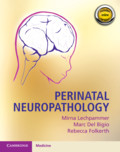Book contents
- Perinatal Neuropathology
- Perinatal Neuropathology
- Copyright page
- Contents
- Preface
- Acknowledgments
- Abbreviations
- Section I Techniques and Practical Considerations
- Approach to Autopsy of the Perinatal Nervous System
- Ancillary Studies
- Chapter 5 Microbiology
- Chapter 6 Cytogenetics and Molecular Diagnostics
- Chapter 7 Metabolic Studies
- Chapter 8 Toxicology
- Prosection Techniques
- Tissue Selection
- Reporting
- Section 2 Human Nervous System Development
- Section 3 Stillbirth
- Section 4 Disruptions / Hypoxic-Ischemic Injury
- Section 5 Malformations
- Section 6 Perinatal Neurooncology
- Section 7 Spinal and Neuromuscular Disorders
- Section 8 Eye Disorders
- Section 9 Infections: In Utero Infections
- Section 10 Metabolic / Toxic Disorders: Storage Diseases
- Section 11 Forensic Neuropathology
- Appendix 1 Technical Considerations in Perinatal CNS
- Index
- References
Chapter 7 - Metabolic Studies
from Ancillary Studies
Published online by Cambridge University Press: 07 August 2021
- Perinatal Neuropathology
- Perinatal Neuropathology
- Copyright page
- Contents
- Preface
- Acknowledgments
- Abbreviations
- Section I Techniques and Practical Considerations
- Approach to Autopsy of the Perinatal Nervous System
- Ancillary Studies
- Chapter 5 Microbiology
- Chapter 6 Cytogenetics and Molecular Diagnostics
- Chapter 7 Metabolic Studies
- Chapter 8 Toxicology
- Prosection Techniques
- Tissue Selection
- Reporting
- Section 2 Human Nervous System Development
- Section 3 Stillbirth
- Section 4 Disruptions / Hypoxic-Ischemic Injury
- Section 5 Malformations
- Section 6 Perinatal Neurooncology
- Section 7 Spinal and Neuromuscular Disorders
- Section 8 Eye Disorders
- Section 9 Infections: In Utero Infections
- Section 10 Metabolic / Toxic Disorders: Storage Diseases
- Section 11 Forensic Neuropathology
- Appendix 1 Technical Considerations in Perinatal CNS
- Index
- References
Summary
Inborn errors of metabolism (IEM), also known as inherited metabolic disorders, are a diverse group consisting of over a thousand different diseases. These are caused by various genetic mutations that result in enzyme deficiency or inactivity, leading to the accumulation of substrate precursors or metabolites, or to enzyme product deficiencies (Table 7.1). The prevalence of individual IEM is low; however the estimated cumulative prevalence of this whole group of disorders is estimated to be 50.9 per 100,000 live births. Most IEMs are inherited in an autosomal recessive manner; however, some conditions are transferred via autosomal dominant or X-linked inheritance [1, 2]. The estimated death rate for IEM is 3.2 per 100,000 globally, with significant differences between developed countries and low-income regions that often lack resources needed for early diagnosis and advanced treatment and care of affected patients [3].
- Type
- Chapter
- Information
- Perinatal Neuropathology , pp. 31 - 38Publisher: Cambridge University PressPrint publication year: 2021



